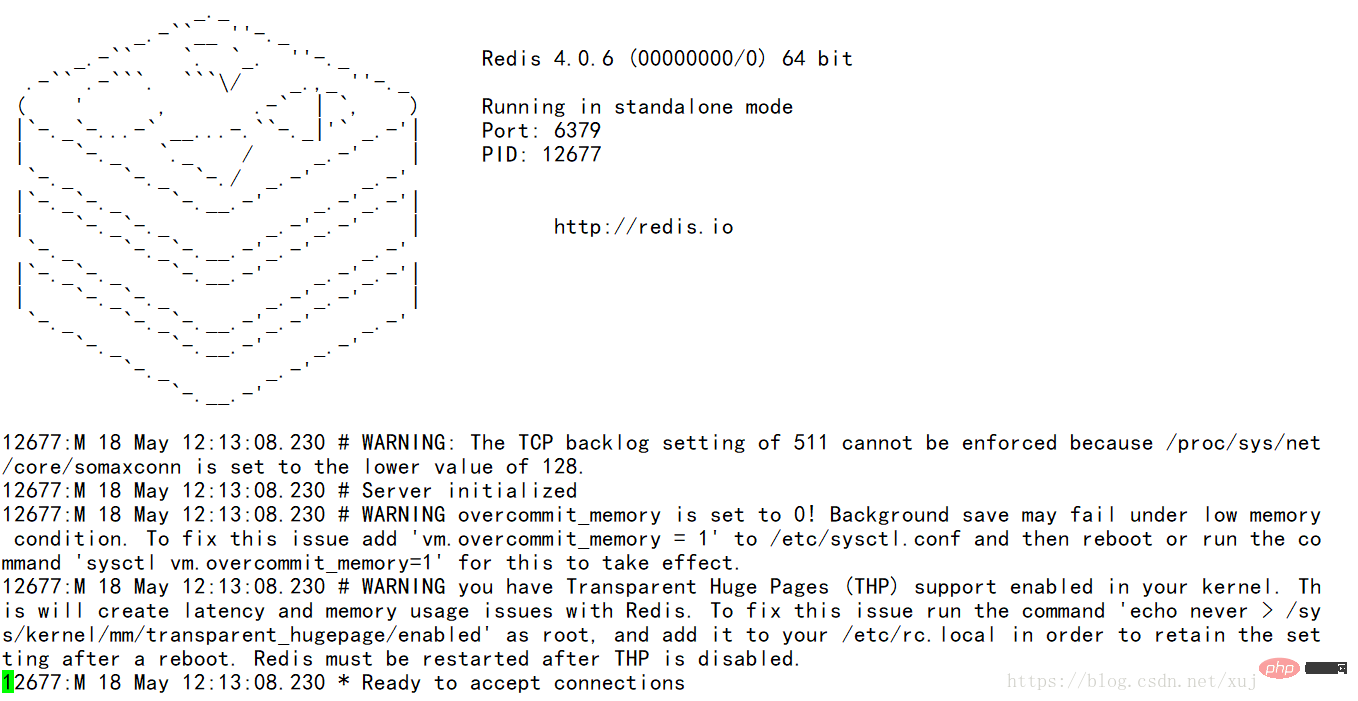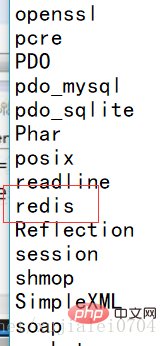How to install redis extension for php7 in centos7
This article will introduce to you how to install the redis extension for php7 in centos7. It has certain reference value. Friends in need can refer to it. I hope it will be helpful to everyone.

Download redis
Download redis, unzip, compile:
$ wget http://download.redis.io/releases/redis-4.0.6.tar.gz $ tar xzf redis-4.0.6.tar.gz $ cd redis-4.0.6 $ make && make PREFIX=/usr/local/redis install #安装到指定目录
Now go to the tar package and unzip it In the source code directory, copy a redis.conf configuration file and place it in the /usr/local/redis/bin/ directory.
Enter the redis directory and run vi redis.conf
to Change daemonize no to daemonize yes, save and exit
Start the Redis service through the following command:
./bin/redis-server ./redis.conf

You can use the built-in client command redis-cli:
$ ./redis-cli redis> set foo bar OK redis> get foo"bar"
The above is to install the redis program
To enable the redis extension in php7
Use git clone to download the phpredis expansion package on git
[root@localhost local ]#git clone https://github.com/phpredis/phpredis.git
At this step, we need to use phpize generated when installing php to generate the configure configuration file,
//Specific use Which one depends on the directory where your phpize file is located. In this case, you should use whereis phpize to view the path
[root@localhost local ]# whereis phpize phpize: /usr/bin/phpize /usr/share/man/man1/phpize.1.gz
This indicates that the path is /usr/bin/phpize, and then execute:
[root@localhost phpredis ]# /usr/bin/phpize Can't find PHP headers in /usr/include/php The php-devel package is required for use of this command.
An error is reported here. The reason is that php-devel is not installed. Since I am using php7.0, I execute the following command:
[root@localhost phpredis]#yum -y install php70w-devel
and then execute it again:
[root@localhost phpredis]# /usr/bin/phpize Configuring for: PHP Api Version: 20151012 Zend Module Api No: 20151012 Zend Extension Api No: 320151012
After executing the previous step, we There is a configure configuration file. Next, configure
[root@localhost phpredis]#./configure
or execute
[root@localhost phpredis]#./configure --with-php-config=/usr/bin/php-config
. Next is to compile and install
[root@localhost phpredis]#make [root@localhost phpredis]# make install Installing shared extensions: /usr/local/php/lib/php/extensions/no-debug-non-zts-20170718/
to configure the php configuration file php.ini (specifically put There you can use whereis php.ini to view), my configuration file php.ini is under /etc/
[root@localhost phpredis]#vim /etc/php.ini
Enable redis extension:
extension = redis.so
The path of the redis.so file can be found in When making install, I see
[root@localhost local]# php -m #Query the extension of php

Restart the nginx server and restart php-fpm, make the configuration take effect
After restarting, we open info.php and you can already see the extended information of redis

Recommended learning:php video tutorial
The above is the detailed content of How to install redis extension for php7 in centos7. For more information, please follow other related articles on the PHP Chinese website!

Hot AI Tools

Undresser.AI Undress
AI-powered app for creating realistic nude photos

AI Clothes Remover
Online AI tool for removing clothes from photos.

Undress AI Tool
Undress images for free

Clothoff.io
AI clothes remover

AI Hentai Generator
Generate AI Hentai for free.

Hot Article

Hot Tools

Notepad++7.3.1
Easy-to-use and free code editor

SublimeText3 Chinese version
Chinese version, very easy to use

Zend Studio 13.0.1
Powerful PHP integrated development environment

Dreamweaver CS6
Visual web development tools

SublimeText3 Mac version
God-level code editing software (SublimeText3)

Hot Topics
 1382
1382
 52
52
 How to build the redis cluster mode
Apr 10, 2025 pm 10:15 PM
How to build the redis cluster mode
Apr 10, 2025 pm 10:15 PM
Redis cluster mode deploys Redis instances to multiple servers through sharding, improving scalability and availability. The construction steps are as follows: Create odd Redis instances with different ports; Create 3 sentinel instances, monitor Redis instances and failover; configure sentinel configuration files, add monitoring Redis instance information and failover settings; configure Redis instance configuration files, enable cluster mode and specify the cluster information file path; create nodes.conf file, containing information of each Redis instance; start the cluster, execute the create command to create a cluster and specify the number of replicas; log in to the cluster to execute the CLUSTER INFO command to verify the cluster status; make
 How to clear redis data
Apr 10, 2025 pm 10:06 PM
How to clear redis data
Apr 10, 2025 pm 10:06 PM
How to clear Redis data: Use the FLUSHALL command to clear all key values. Use the FLUSHDB command to clear the key value of the currently selected database. Use SELECT to switch databases, and then use FLUSHDB to clear multiple databases. Use the DEL command to delete a specific key. Use the redis-cli tool to clear the data.
 How to use the redis command
Apr 10, 2025 pm 08:45 PM
How to use the redis command
Apr 10, 2025 pm 08:45 PM
Using the Redis directive requires the following steps: Open the Redis client. Enter the command (verb key value). Provides the required parameters (varies from instruction to instruction). Press Enter to execute the command. Redis returns a response indicating the result of the operation (usually OK or -ERR).
 How to read redis queue
Apr 10, 2025 pm 10:12 PM
How to read redis queue
Apr 10, 2025 pm 10:12 PM
To read a queue from Redis, you need to get the queue name, read the elements using the LPOP command, and process the empty queue. The specific steps are as follows: Get the queue name: name it with the prefix of "queue:" such as "queue:my-queue". Use the LPOP command: Eject the element from the head of the queue and return its value, such as LPOP queue:my-queue. Processing empty queues: If the queue is empty, LPOP returns nil, and you can check whether the queue exists before reading the element.
 How to use single threaded redis
Apr 10, 2025 pm 07:12 PM
How to use single threaded redis
Apr 10, 2025 pm 07:12 PM
Redis uses a single threaded architecture to provide high performance, simplicity, and consistency. It utilizes I/O multiplexing, event loops, non-blocking I/O, and shared memory to improve concurrency, but with limitations of concurrency limitations, single point of failure, and unsuitable for write-intensive workloads.
 How to use redis lock
Apr 10, 2025 pm 08:39 PM
How to use redis lock
Apr 10, 2025 pm 08:39 PM
Using Redis to lock operations requires obtaining the lock through the SETNX command, and then using the EXPIRE command to set the expiration time. The specific steps are: (1) Use the SETNX command to try to set a key-value pair; (2) Use the EXPIRE command to set the expiration time for the lock; (3) Use the DEL command to delete the lock when the lock is no longer needed.
 How to read the source code of redis
Apr 10, 2025 pm 08:27 PM
How to read the source code of redis
Apr 10, 2025 pm 08:27 PM
The best way to understand Redis source code is to go step by step: get familiar with the basics of Redis. Select a specific module or function as the starting point. Start with the entry point of the module or function and view the code line by line. View the code through the function call chain. Be familiar with the underlying data structures used by Redis. Identify the algorithm used by Redis.
 How to make message middleware for redis
Apr 10, 2025 pm 07:51 PM
How to make message middleware for redis
Apr 10, 2025 pm 07:51 PM
Redis, as a message middleware, supports production-consumption models, can persist messages and ensure reliable delivery. Using Redis as the message middleware enables low latency, reliable and scalable messaging.




